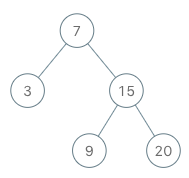
g0101_0200.s0173_binary_search_tree_iterator.readme.md Maven / Gradle / Ivy
Go to download
Show more of this group Show more artifacts with this name
Show all versions of leetcode-in-java Show documentation
Show all versions of leetcode-in-java Show documentation
Java-based LeetCode algorithm problem solutions, regularly updated
The newest version!
173\. Binary Search Tree Iterator
Medium
Implement the `BSTIterator` class that represents an iterator over the **[in-order traversal](https://en.wikipedia.org/wiki/Tree_traversal#In-order_(LNR))** of a binary search tree (BST):
* `BSTIterator(TreeNode root)` Initializes an object of the `BSTIterator` class. The `root` of the BST is given as part of the constructor. The pointer should be initialized to a non-existent number smaller than any element in the BST.
* `boolean hasNext()` Returns `true` if there exists a number in the traversal to the right of the pointer, otherwise returns `false`.
* `int next()` Moves the pointer to the right, then returns the number at the pointer.
Notice that by initializing the pointer to a non-existent smallest number, the first call to `next()` will return the smallest element in the BST.
You may assume that `next()` calls will always be valid. That is, there will be at least a next number in the in-order traversal when `next()` is called.
**Example 1:**

**Input** ["BSTIterator", "next", "next", "hasNext", "next", "hasNext", "next", "hasNext", "next", "hasNext"] [[[7, 3, 15, null, null, 9, 20]], [], [], [], [], [], [], [], [], []]
**Output:** [null, 3, 7, true, 9, true, 15, true, 20, false]
**Explanation:**
BSTIterator bSTIterator = new BSTIterator([7, 3, 15, null, null, 9, 20]);
bSTIterator.next(); // return 3
bSTIterator.next(); // return 7
bSTIterator.hasNext(); // return True
bSTIterator.next(); // return 9
bSTIterator.hasNext(); // return True
bSTIterator.next(); // return 15
bSTIterator.hasNext(); // return True
bSTIterator.next(); // return 20
bSTIterator.hasNext(); // return False
**Constraints:**
* The number of nodes in the tree is in the range [1, 105].
* 0 <= Node.val <= 106
* At most 105 calls will be made to `hasNext`, and `next`.
**Follow up:**
* Could you implement `next()` and `hasNext()` to run in average `O(1)` time and use `O(h)` memory, where `h` is the height of the tree?© 2015 - 2024 Weber Informatics LLC | Privacy Policy